Feta Cheese
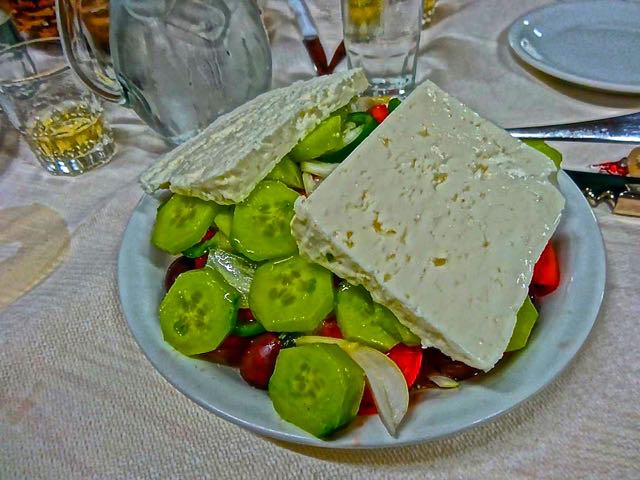 Everyone is familiar with feta cheese which is made from sheep, goat or cow and is the national cheese of Greece if there is such a thing. Recently the EU made it a law that only the Greeks could call their cheese Feta. Feta cheese is actually from the area of Roumeli but they make it and eat it just about everywhere
they have mountains and sheep or goats including Ipirus, the Peloponessos and Lesvos. It is probably the healthiest cheese you can eat when it is made from sheep or goat. Feta is soaked in brine to keep it from going bad. It is not an aged cheese and in fact if you leave it
too long it gets too salty. I use it in my spanakopita(spinach pie), just like my grandmother, in fact I am the type who believes when making spanakopita, or any vegetable pita, the more feta you use, the better. To me there is no feeling like the first bite of a piece of good local feta. It makes your whole mouth come alive with sensation. I also use it in my omelets and in a feta saganaki I learned from the famous Rolando of Kea. One thing you will notice in Greece is
that you
will get a lot more feta on your salad than you would at your favorite Greek restaurant in your home country, especially on the less touristy islands where the cheese is likely to have been made locally and even by the owners of the restaurant. You can buy commercial feta in any Greek supermarket or food shop but you should always ask if they have dopio (local). The vilage of Mesotopos in Lesvos is known for its feta as are several others on the sheep rich island. In Lemnos the Kalathaki Limnou at one time was listed as the #1 cheese in the world on one of those charts that float around social media gathering likes and starting arguments. It is similar to feta and made with sheep and goat milk. In fact it is so similar you probably won't be able to tell the difference. Everyone is familiar with feta cheese which is made from sheep, goat or cow and is the national cheese of Greece if there is such a thing. Recently the EU made it a law that only the Greeks could call their cheese Feta. Feta cheese is actually from the area of Roumeli but they make it and eat it just about everywhere
they have mountains and sheep or goats including Ipirus, the Peloponessos and Lesvos. It is probably the healthiest cheese you can eat when it is made from sheep or goat. Feta is soaked in brine to keep it from going bad. It is not an aged cheese and in fact if you leave it
too long it gets too salty. I use it in my spanakopita(spinach pie), just like my grandmother, in fact I am the type who believes when making spanakopita, or any vegetable pita, the more feta you use, the better. To me there is no feeling like the first bite of a piece of good local feta. It makes your whole mouth come alive with sensation. I also use it in my omelets and in a feta saganaki I learned from the famous Rolando of Kea. One thing you will notice in Greece is
that you
will get a lot more feta on your salad than you would at your favorite Greek restaurant in your home country, especially on the less touristy islands where the cheese is likely to have been made locally and even by the owners of the restaurant. You can buy commercial feta in any Greek supermarket or food shop but you should always ask if they have dopio (local). The vilage of Mesotopos in Lesvos is known for its feta as are several others on the sheep rich island. In Lemnos the Kalathaki Limnou at one time was listed as the #1 cheese in the world on one of those charts that float around social media gathering likes and starting arguments. It is similar to feta and made with sheep and goat milk. In fact it is so similar you probably won't be able to tell the difference.
|
Mizithra (Xino, Kopanisti and Manouri)
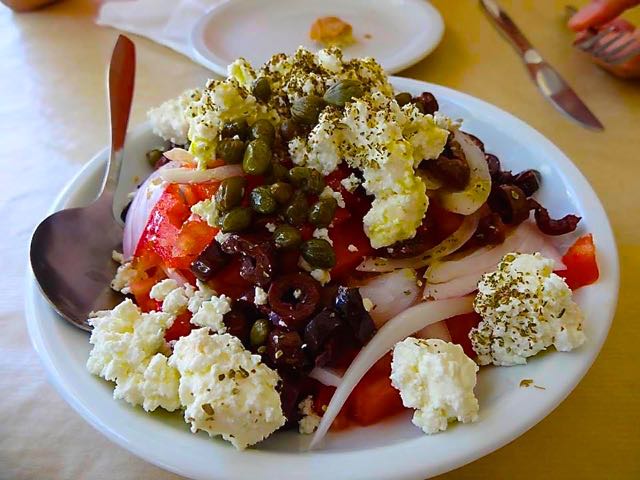 Mizithra is one of those cheeses that depending on where you are will be completely different. The common one is the skliri mizithra which is a hard cheese, like parmesan, which can be dried and grated on pastas and other dishes. But when I think of mizithra I think of the Sifnos variety which is a cross
between feta and cottage cheese. Imagine a mild feta with
the consistency of ricotta. This is usually found on the horiatiki salads on the island but can also be ordered separately. On the island of Kea they use a cheese that is similar in consistency to the Sifniot mizithra and they call it xino tiri which means sour cheese. It is more intense than mizithra or feta. When it is available I get it on my salad. Manouri is also made from goat or sheep milk and is a soft cheese from Macedonia and Thessaly. There is also a kopanisti
that is actually too intense for a salad which you order as a side and spread on bread or
eat with ouzo. Mizithra is one of those cheeses that depending on where you are will be completely different. The common one is the skliri mizithra which is a hard cheese, like parmesan, which can be dried and grated on pastas and other dishes. But when I think of mizithra I think of the Sifnos variety which is a cross
between feta and cottage cheese. Imagine a mild feta with
the consistency of ricotta. This is usually found on the horiatiki salads on the island but can also be ordered separately. On the island of Kea they use a cheese that is similar in consistency to the Sifniot mizithra and they call it xino tiri which means sour cheese. It is more intense than mizithra or feta. When it is available I get it on my salad. Manouri is also made from goat or sheep milk and is a soft cheese from Macedonia and Thessaly. There is also a kopanisti
that is actually too intense for a salad which you order as a side and spread on bread or
eat with ouzo.
|
Other Greek Cheeses
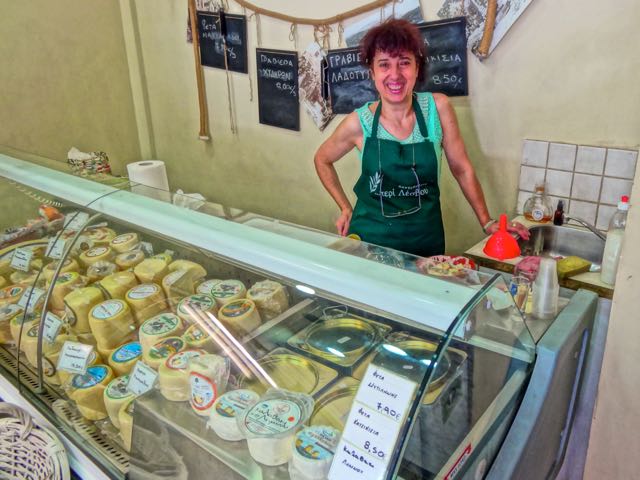 Kasseri Kasseri
This is a sheep or goats milk cheese, available in many gourmet grocery stores in the USA. It is good for slicing and eating plain but is commonly used in saganaki, covered in oil, oregano and other spices and baked, or even deep-fried. The best kasseri comes from Lesvos, Naxos and Crete though people from other areas will argue this.
Ladotiri
This is a cheese from Lesvos that is made from sheep or goat milk and is preserved in oil.
Kefalotyri
This is a sharp, hard and salty cheese usually made from sheeps milk and can also be used in saganaki or grated on to pasta dishes. Similar to kasseri.
Graviera
This is a translation of the French gruyere and is made from cow, sheep or goats milk. Like kefalotiri and kasseri you may find yourself in areas of Greece where it will be hard to tell the difference between the three. In fact all three can be used in the same way.
|
|
Touloumotiri
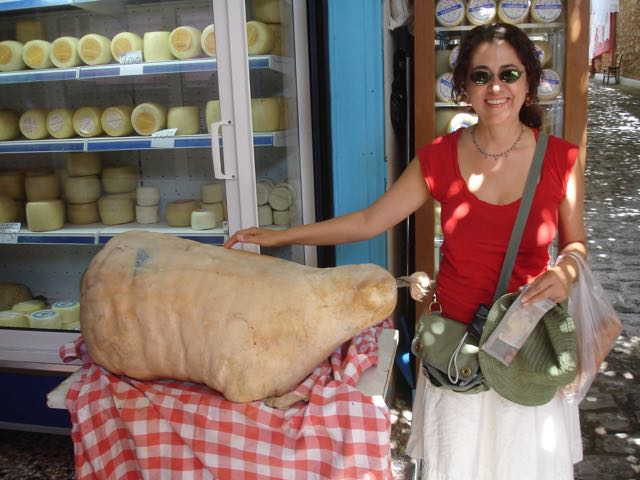 Touloumotiri is a sheep cheese that is aged in the skin of a sheep or goat for several months and sold in several of the cheese shops on the island of Lesvos in the town of Agiassos next to the church along with many other cheeses from around Lesvos which is famous for its hard and medium hard cheeses like ladotiri, kefalograviera and kaseri, especially the villages of Vatousa, Xidira, Mesotopos, Agra, and Montemados which all have cheese factories where sheep and goat farmers can sell their milk. There are as many cheeses as there are people who make them. Every area will have a local cheese and some of the names may confuse you because they will have nothing to do with the name you associate with a particular cheese. You may go to one island and get their special island cheese and realize that this is the
same as the special island cheese of another island. Even individual cheese-makers will have their own special variety. The best cheese comes from the areas that have the most goats, sheep or cows. Touloumotiri is a sheep cheese that is aged in the skin of a sheep or goat for several months and sold in several of the cheese shops on the island of Lesvos in the town of Agiassos next to the church along with many other cheeses from around Lesvos which is famous for its hard and medium hard cheeses like ladotiri, kefalograviera and kaseri, especially the villages of Vatousa, Xidira, Mesotopos, Agra, and Montemados which all have cheese factories where sheep and goat farmers can sell their milk. There are as many cheeses as there are people who make them. Every area will have a local cheese and some of the names may confuse you because they will have nothing to do with the name you associate with a particular cheese. You may go to one island and get their special island cheese and realize that this is the
same as the special island cheese of another island. Even individual cheese-makers will have their own special variety. The best cheese comes from the areas that have the most goats, sheep or cows.
|
Where to Buy Greek Cheese
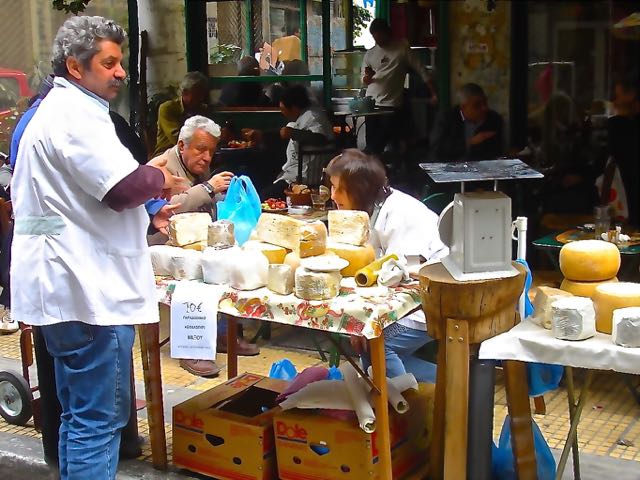 Cheese can be bought in any supermarket or grocery store in Greece but in the neighborhood around the Athens Public Market on Athinas Street there are shops that sell only cheese, and some that sell only feta. For cheese from Lesvos there is a shop of Lesvos products right next
to the Hotel Attalos on Athinas Street where you can buy cheese from any of the cheese makers in Lesvos. The hard cheeses come with a wax outer coating and the softer cheeses are well wrapped so you can take them home with you in your luggage. Whether or not it is legal I could not tell you but if customs find it you probably won't go to jail. You can also find Naxos cheese at the small Naxos grocery store known as the Geniko Emborio Eklekton Proionton Naxos
(or the General Choice Products of Naxos Store) on Ag. Theklas Street in Psiri a few steps beyond Melissinos the Poet-Sandalmaker. This store is famous for their kefalotiri. If you are in Athens around Easter there is a lamb, wine and cheese market in Psiri where people come from Naxos to sell their wares. Even during the year you can find individual cheese-makers selling their
cheese on the streets of Psiri. In Kypseli Oi Rizes Mas is a small cheese shop with a large selection of cheeses from all over Greece. It is next to the old Public Market on Fokionos Negri at Zakynthou Street #3. The owners speak English. Cheese can be bought in any supermarket or grocery store in Greece but in the neighborhood around the Athens Public Market on Athinas Street there are shops that sell only cheese, and some that sell only feta. For cheese from Lesvos there is a shop of Lesvos products right next
to the Hotel Attalos on Athinas Street where you can buy cheese from any of the cheese makers in Lesvos. The hard cheeses come with a wax outer coating and the softer cheeses are well wrapped so you can take them home with you in your luggage. Whether or not it is legal I could not tell you but if customs find it you probably won't go to jail. You can also find Naxos cheese at the small Naxos grocery store known as the Geniko Emborio Eklekton Proionton Naxos
(or the General Choice Products of Naxos Store) on Ag. Theklas Street in Psiri a few steps beyond Melissinos the Poet-Sandalmaker. This store is famous for their kefalotiri. If you are in Athens around Easter there is a lamb, wine and cheese market in Psiri where people come from Naxos to sell their wares. Even during the year you can find individual cheese-makers selling their
cheese on the streets of Psiri. In Kypseli Oi Rizes Mas is a small cheese shop with a large selection of cheeses from all over Greece. It is next to the old Public Market on Fokionos Negri at Zakynthou Street #3. The owners speak English.
|
|

 Everyone is familiar with feta cheese which is made from sheep, goat or cow and is the national cheese of Greece if there is such a thing. Recently the EU made it a law that only the Greeks could call their cheese Feta. Feta cheese is actually from the area of Roumeli but they make it and eat it just about everywhere
they have mountains and sheep or goats including Ipirus, the Peloponessos and Lesvos. It is probably the healthiest cheese you can eat when it is made from sheep or goat. Feta is soaked in brine to keep it from going bad. It is not an aged cheese and in fact if you leave it
too long it gets too salty. I use it in my spanakopita(spinach pie), just like my grandmother, in fact I am the type who believes when making spanakopita, or any vegetable pita, the more feta you use, the better. To me there is no feeling like the first bite of a piece of good local feta. It makes your whole mouth come alive with sensation. I also use it in my omelets and in a feta saganaki I learned from the famous Rolando of Kea. One thing you will notice in Greece is
that you
will get a lot more feta on your salad than you would at your favorite Greek restaurant in your home country, especially on the less touristy islands where the cheese is likely to have been made locally and even by the owners of the restaurant. You can buy commercial feta in any Greek supermarket or food shop but you should always ask if they have dopio (local). The vilage of Mesotopos in Lesvos is known for its feta as are several others on the sheep rich island. In Lemnos the Kalathaki Limnou at one time was listed as the #1 cheese in the world on one of those charts that float around social media gathering likes and starting arguments. It is similar to feta and made with sheep and goat milk. In fact it is so similar you probably won't be able to tell the difference.
Everyone is familiar with feta cheese which is made from sheep, goat or cow and is the national cheese of Greece if there is such a thing. Recently the EU made it a law that only the Greeks could call their cheese Feta. Feta cheese is actually from the area of Roumeli but they make it and eat it just about everywhere
they have mountains and sheep or goats including Ipirus, the Peloponessos and Lesvos. It is probably the healthiest cheese you can eat when it is made from sheep or goat. Feta is soaked in brine to keep it from going bad. It is not an aged cheese and in fact if you leave it
too long it gets too salty. I use it in my spanakopita(spinach pie), just like my grandmother, in fact I am the type who believes when making spanakopita, or any vegetable pita, the more feta you use, the better. To me there is no feeling like the first bite of a piece of good local feta. It makes your whole mouth come alive with sensation. I also use it in my omelets and in a feta saganaki I learned from the famous Rolando of Kea. One thing you will notice in Greece is
that you
will get a lot more feta on your salad than you would at your favorite Greek restaurant in your home country, especially on the less touristy islands where the cheese is likely to have been made locally and even by the owners of the restaurant. You can buy commercial feta in any Greek supermarket or food shop but you should always ask if they have dopio (local). The vilage of Mesotopos in Lesvos is known for its feta as are several others on the sheep rich island. In Lemnos the Kalathaki Limnou at one time was listed as the #1 cheese in the world on one of those charts that float around social media gathering likes and starting arguments. It is similar to feta and made with sheep and goat milk. In fact it is so similar you probably won't be able to tell the difference.  Mizithra is one of those cheeses that depending on where you are will be completely different. The common one is the skliri mizithra which is a hard cheese, like parmesan, which can be dried and grated on pastas and other dishes. But when I think of mizithra I think of the Sifnos variety which is a cross
between feta and cottage cheese. Imagine a mild feta with
the consistency of ricotta. This is usually found on the horiatiki salads on the island but can also be ordered separately. On the island of Kea they use a cheese that is similar in consistency to the Sifniot mizithra and they call it xino tiri which means sour cheese. It is more intense than mizithra or feta. When it is available I get it on my salad. Manouri is also made from goat or sheep milk and is a soft cheese from Macedonia and Thessaly. There is also a kopanisti
that is actually too intense for a salad which you order as a side and spread on bread or
eat with ouzo.
Mizithra is one of those cheeses that depending on where you are will be completely different. The common one is the skliri mizithra which is a hard cheese, like parmesan, which can be dried and grated on pastas and other dishes. But when I think of mizithra I think of the Sifnos variety which is a cross
between feta and cottage cheese. Imagine a mild feta with
the consistency of ricotta. This is usually found on the horiatiki salads on the island but can also be ordered separately. On the island of Kea they use a cheese that is similar in consistency to the Sifniot mizithra and they call it xino tiri which means sour cheese. It is more intense than mizithra or feta. When it is available I get it on my salad. Manouri is also made from goat or sheep milk and is a soft cheese from Macedonia and Thessaly. There is also a kopanisti
that is actually too intense for a salad which you order as a side and spread on bread or
eat with ouzo. Kasseri
Kasseri Touloumotiri
Touloumotiri Cheese can be bought in any supermarket or grocery store in Greece but in the neighborhood around the
Cheese can be bought in any supermarket or grocery store in Greece but in the neighborhood around the 
